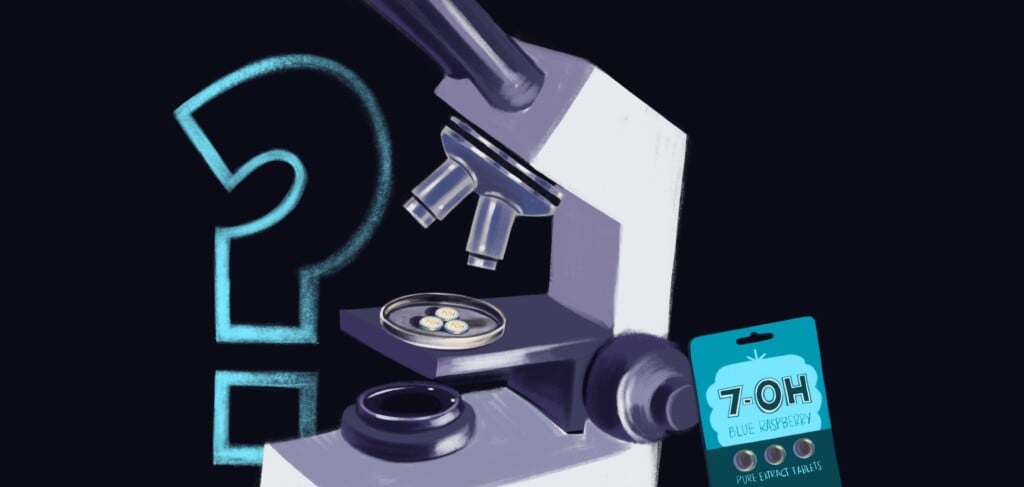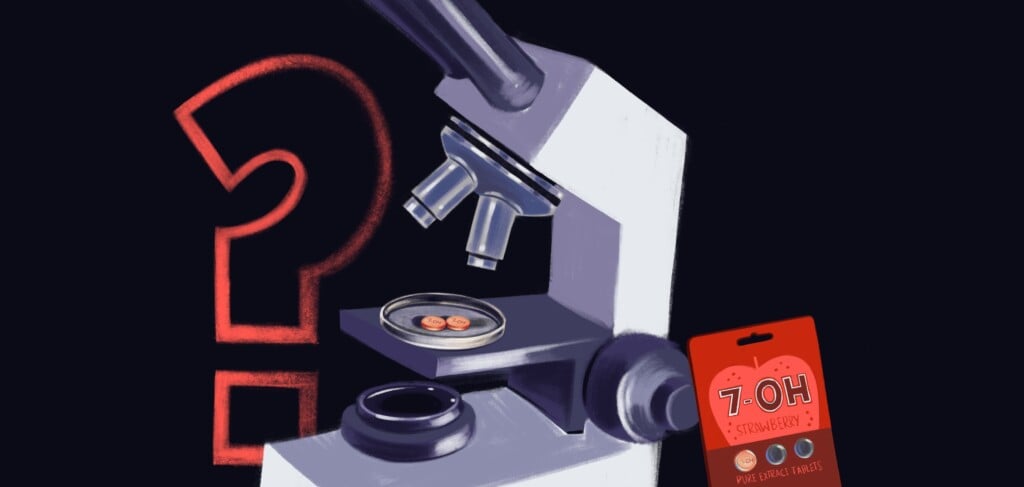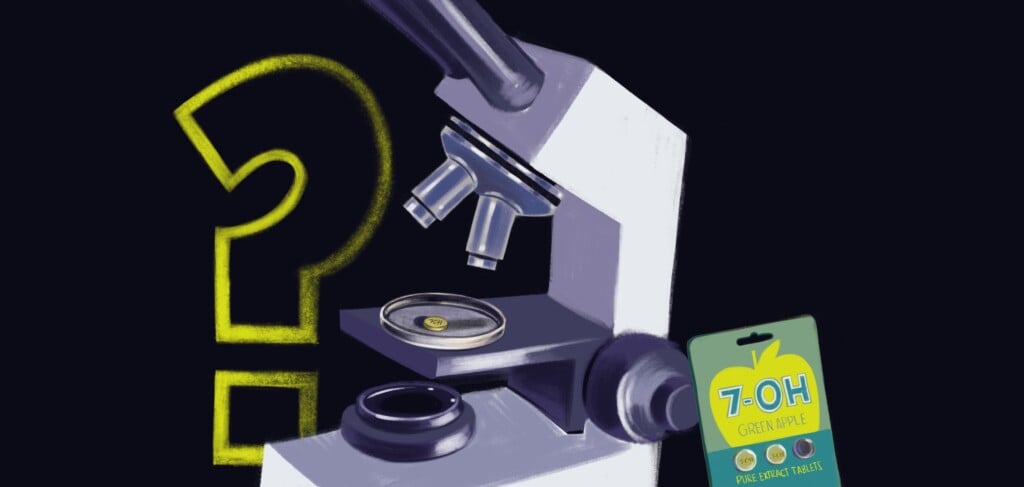In a data void, 7-OH addictions and contradictions are debated on social media
This is the second article of a three-part series regarding 7-OH and the billion-dollar industry expanding atop the kratom extract. The first article can be found here. The third article of the series will be published tomorrow morning at 8:00 a.m.
As stated in the first article of this three-part series, one of the largest concerns regarding the sale of 7-OH is the risk of addiction for customers. With no formal federal regulation, the product continues to get passed into the hands of consumers at gas stations, smoke shops, and alternative wellness retailers throughout the nation. And the consequences are falling in the laps of everyday Americans.
There is a subreddit page called r/quitting7-OH, with around 7.5 thousand weekly visitors and 3.5 thousand weekly contributions. Within this subreddit are thousands of individuals who have provided information on traumatic personal experiences regarding 7-OH use, along with success stories from those who have remained clean after quitting the substance. Also found in this subreddit is a link to a Discord server called 7-OH Kratom – Drugs & Alcohol Recovery Community.
The Pitch joined the chatroom and had the opportunity to interview a few of the members within the community. Just taking a simple glance at the subreddit and the Discord, it is evident that tens of thousands of individuals have had their lives altered by taking the substance, and the personal testimonies that The Pitch gathered speak for themselves.
In speaking with a few members of these communities, each says that what started out as a holistic healing method quickly spiraled into a severe and uncontrollable habit. Our previous article dives into why these individuals take the substance. Within this piece, you will find information regarding what happens when one lets the substance take them.
“Crawling up the walls”
An anonymous 47-year-old software developer, who will be referred to as Tim, says that he quickly saw his dependence increase after taking 7-OH products in August of last year. Within a month, his dosage rose from a couple of 7.5mg tablets a day to 15. After attempting to quit many times, Tim says that his last cycle with 7-OH saw him taking 200-300mg a day.
The same can be said for Joseph Valentino, a 33-year-old manager at a Sonic in Memphis, and an anonymous part-time weightlifting coach in Atlanta, who will be referred to as Jane. Valentino says that, although he only began using 7-OH in May 2025, by late June, his dosage was up to 1000mg a day, simply to maintain the effects that the initial dosage gave him. Jane says that after she began taking the substance this past January, she was a “fairly heavy user” come the spring. What started out as 30mg a day, then rapidly shifted to 100mg, then 200mg, climbing all the way up to 300mg a day.
“The ability to achieve the same energetic euphoria diminished over time, even at increasingly higher doses,” Jane says.
Once they reached these incredibly high dosage levels, where the substance was more or less used to prevent any type of withdrawal, the effects that they would endure shifted from a euphoric boost to brain fog, they claim.
“Something happens, and every time you take it now, it’s extreme anxiety,” Valentino says. “You get anti-social, you get the jitters, you get twitches, you get hot flashes.”
Not only has the substance wiped their mental state, but it has also cleared out their pockets. Tim and Valentino say that they found themselves spending over $1,000 on the product during their peak months. Jane says that she was probably spending $2,000 to $3,000 on the product at her peak dependency.
“I definitely was concerned, mostly about the money I was paying out, because it’s not an inexpensive product,” Tim says.
However, regardless of the price tag on the package, they still continued to purchase the product. They say that this was simply to combat any symptoms that came with discontinuing taking the product. When they describe the symptoms that come with the withdrawal, the portrayals are far from pretty.
The symptoms described by these three individuals are anxious energy, restless legs and arms, insomnia, irritability, chills, nausea, diarrhea, and hot flashes. They say that these symptoms start to become noticeable as little as 12 hours after taking their last dose, with the withdrawal lasting anywhere from five to 10 days. They say that they’ve used suboxone or traditional kratom to help ease the effects.
American Shaman and American Botanicals Founder Vince Sanders says that adverse reactions to the products stem from individuals searching for recreational highs.
“They went in not intending to treat pain,” he says. “They were looking to get high or they were looking for that type of experience.”
Once these three realized how challenging it would be to stop taking the substance, they went searching for help. Tim says that, when he tried to quit for the first time last September, he found the r/quitting7-OH subreddit page—he says there were only about 10 members at the time. Shortly after, the Discord server that functions as a recovery community was founded, and he became a moderator. Joseph Valentino is also a moderator within the server. They tell The Pitch that the withdrawal symptoms reported by users within the chat are similar to what they have endured.
“I’ve heard the phrase ‘crawling up the walls’ and I think that was like what I experienced walking around my room not knowing what to do, just trying to expel energy,” Tim says.
Postings within the subreddit and Discord server reflect their statements, with titles such as “3 Days 7 o free…what to do next help”, “Hour 10 and I’m scared”, and “I quit pain pills, benzos, alcohol, cocaine, & weed, but the WD for 7OH are soooo much worse in my opinion!”.
Jane went as far as checking herself into a detox center when she realized that she could not quit alone, as she has never dealt with anything of this magnitude before.
“I’m taking this very seriously and doing an intensive outpatient program just to really kick this, because I’ve never had an addiction before, and I do not want to have it again,” she says.
Jane says that the youngest member of her program is an 18-year-old boy. “That hit me really hard to see, to see a young person in there,” she says.
Subreddit pages and Discord servers aren’t the only places where you can find people banding together to help each other curb their addiction. Two certified peer support specialists, Hilary Tesluck and Decima Davis, started their organization, Kratom Quitters, in 2023 to help support recovering kratom addicts, like themselves.
They say that about two years ago, 7-OH users began joining their organization, searching for help. They claim to have seen an incredibly large increase in members trying to recover from 7-OH addiction this past summer, now with about 10,000 total participants in the group.
“The community has been growing pretty rapidly since the start, but since 7-OH hit the scene, our membership just increased at a rate that we’re having a really hard time keeping up with. It’s become a full-time job,” Davis says.
Now, they say it’s almost strictly 7-OH users joining them. “Nearly all of the people that are joining us are 7-OH users,” Tesluck says. “I cannot remember a person joining our community that is just powder only. It’s been months since I can say that.”
What they have seen and heard from the individuals in their association is on par with the testimonies from the three interviewees, as well as online postings.
“If you just think of it as a heroin addiction, it’s the same thing. It’s the same symptoms, because it’s a powerful opioid,” Tesluck says.
The two, along with other leaders of the community, host multiple meetings each day, averaging about 30 attendees each session, and also offer 24/7 support within a live chat. They say that organizations like theirs are crucial at this time, as most rehab and detox centers are unfamiliar with 7-OH and how to properly treat addicts.
“A lot of the people that come to us seek help from 12-step groups or detoxes and rehabs that don’t always know what kratom is or what 7-O is,” Tesluck says. “So we exist to address that gap, to provide support for this very specific, nuanced, and unfortunately legal problem that we have.”
Even some of the KC-based 7-OH users say they have noticed slight withdrawals when refraining from taking the product for a short period of time. However, none of them says that they have tried to completely quit.
“I would have like, you know, sniffly nose and runny eyes and kind of restless if I didn’t take it for a day,” says John Barnes, a 51-year-old retired real estate appraiser in Kansas City.
When considering the potential withdrawal that is ahead of them, the American Shaman customers say that they are only slightly worried. However, despite numerous personal testimonies that explain that traumatic impact, none of them intend to change their lifestyle.
“Those negatives do not outweigh the positives for it, which would be me being able to function through the day, and it also keeps my knees from buckling up on me and stiffening all the time,” Barnes says. “I’ve been happy with it.”
Chris Morgan, a local 50-year-old foreman for a tree trimming company, says, regardless of whether or not he will ever experience withdrawals, “it doesn’t matter, because it’s helped me.”
Irrespective of whether these 7-OH users who have been satisfied with the product will have to put an end to their use is unknown. With the FDA targeting the substance, as well as multiple states throughout the nation, including the Missouri Department of Health and Senior Services, which recently issued a health advisory associated with 7-OH, regulation seems to be on the horizon.
Currently, there is very little research on the substance, which is why many believe that federal regulation needs to be structured in order to ensure public health safety. However, the next best steps remain a cluster of confusion among health professionals, regulators, business owners, and users of the product themselves.









